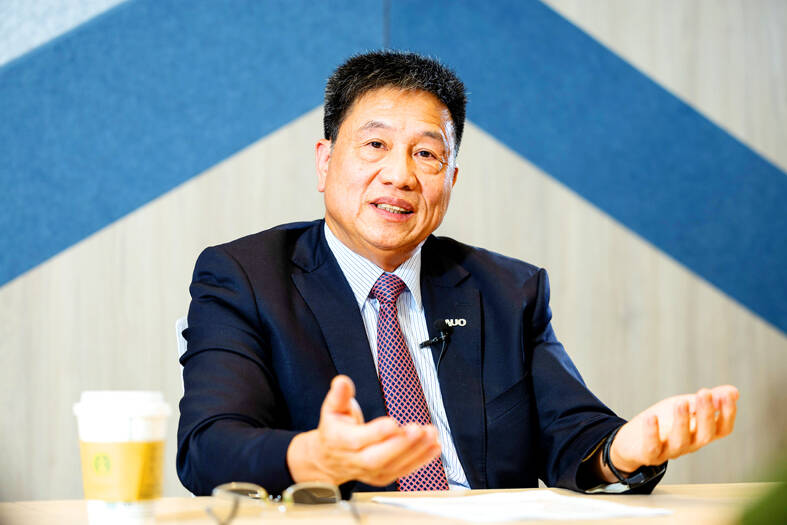This year’s Computex Taipei would be the biggest since the outbreak of COVID-19, featuring around 1,500 exhibitors and attended by several luminaries of the artificial intelligence (AI) boom, including Nvidia Corp CEO Jensen Huang (黃仁勳), Advanced Micro Devices Inc CEO Lisa Su (蘇姿丰) and Intel Corp CEO Pat Gelsinger.
Others scheduled to appear and give keynote speeches at the annual show, which opens on June 4, are Qualcomm Inc CEO Cristiano Amon and Super Micro Computer Inc CEO Charles Liang (梁見後).
There are many reasons for the show’s popularity, including its compelling theme — “Connecting AI” — and the rise of AI products, said Paul Peng (彭?浪), chairman of the Taipei Computer Association (TCA, 台北電腦公會), co-organizer of Computex.

Photo: CNA
New opportunities related to the emergence of AI PCs ensure that CEOs are showing up, “especially with the growth of the IT industry in the first half of 2024 [being] a bit lackluster,” said Peng, who is also the chairman of leading display panel manufacturer AUO Corp (友達).
Geopolitics might also be playing a role.
“Since the onset of the pandemic and the US-China trade war, fewer people from the West have entered China,” Peng said in an interview.
However, because executives still want to know more about the region, “Taiwan has become the optimal place for them to obtain the information,” he said.
Peng added that there could also be a “competition” among them, with some fearing that if other “heavyweights” are attending, “then I have to go, too, to show my weight.”
The significance of this year’s Computex goes well beyond its scale and glitz, he said.
Its theme, “Connecting AI,” shows how far Taiwan’s computer industry has come, as AI computing, advanced connectivity and immersive reality, to name a few, are to be featured at this year’s expo.
“Taiwan’s ICT supply chain [for AI development] is highly comprehensive, and AI applications are now emphasized with promoted field trials,” Peng said when asked how AI would further benefit Taiwan’s tech industry.
One AI application is the smart city, he said, adding that more than 100 city heads or representatives attended the Smart City Summit and Expo held in Taipei last month.
The event was also organized by the TCA and had record attendance.
“They came in anticipation of cooperating with Taiwanese companies to have those companies’ applications and solutions exported to their cities, so I believe Taiwan has a good chance to make inroads into the AI sector,” Peng said.
The trade show also coincides with the 50th anniversary of the TCA.
Peng said that becoming the chairman of the computer association as a panel maker in 2019 was another indicator of the evolution of Taiwan’s tech sector.
In the past, “most TCA chairpersons were from system integration companies, such as early computer manufacturers MiTAC Holdings Corp (神達) and Acer Inc (宏碁), but AUO is a computer parts manufacturer,” he said.
That shows how Taiwan’s computer industry has transformed into an all-encompassing information and communications technology industry, “from software to hardware, from computer parts to total solutions and even cybersecurity,” all of which would be on display at Computex, he said.
AUO itself has moved in that direction, branching out from display panel making to providing total solutions for meeting space management for enterprises and educational interactive classroom solutions, Peng said.
With the TCA expanding into new fields, in part because the COVID-19 pandemic rendered offline exhibitions impossible, many alliances have since 2020 been set up to keep up with technological development and keep collaborations going, he added.

In Italy’s storied gold-making hubs, jewelers are reworking their designs to trim gold content as they race to blunt the effect of record prices and appeal to shoppers watching their budgets. Gold prices hit a record high on Thursday, surging near US$5,600 an ounce, more than double a year ago as geopolitical concerns and jitters over trade pushed investors toward the safe-haven asset. The rally is putting undue pressure on small artisans as they face mounting demands from customers, including international brands, to produce cheaper items, from signature pieces to wedding rings, according to interviews with four independent jewelers in Italy’s main

Macronix International Co (旺宏), the world’s biggest NOR flash memory supplier, yesterday said it would spend NT$22 billion (US$699.1 million) on capacity expansion this year to increase its production of mid-to-low-density memory chips as the world’s major memorychip suppliers are phasing out the market. The company said its planned capital expenditures are about 11 times higher than the NT$1.8 billion it spent on new facilities and equipment last year. A majority of this year’s outlay would be allocated to step up capacity of multi-level cell (MLC) NAND flash memory chips, which are used in embedded multimedia cards (eMMC), a managed

In the wake of strong global demand for AI applications, Taiwan’s export-oriented economy accelerated with the composite index of economic indicators flashing the first “red” light in December for one year, indicating the economy is in booming mode, the National Development Council (NDC) said yesterday. Moreover, the index of leading indicators, which gauges the potential state of the economy over the next six months, also moved higher in December amid growing optimism over the outlook, the NDC said. In December, the index of economic indicators rose one point from a month earlier to 38, at the lower end of the “red” light.

Japanese Prime Minister Sanae Takaichi has talked up the benefits of a weaker yen in a campaign speech, adopting a tone at odds with her finance ministry, which has refused to rule out any options to counter excessive foreign exchange volatility. Takaichi later softened her stance, saying she did not have a preference for the yen’s direction. “People say the weak yen is bad right now, but for export industries, it’s a major opportunity,” Takaichi said on Saturday at a rally for Liberal Democratic Party candidate Daishiro Yamagiwa in Kanagawa Prefecture ahead of a snap election on Sunday. “Whether it’s selling food or